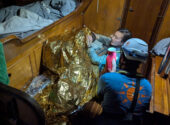In 2017, the EU Commission created a backdoor for pushbacks to Libya. In the same year, Sea-Watch began monitoring these human rights violations from the air. This should now come to an end, according to an authority of the far-right transport minister in Italy.
Ships from EU states are not allowed to return asylum seekers to torture states such as Libya. In order to circumvent this ban on so-called pushbacks, the EU Commission has created a loophole in international law and has helped set up a Libyan coastguard since 2017. These militias abduct refugees in international waters to bring them to torture camps, regularly use weapons during these pullbacks and let people drown.
The organisation Sea-Watch has also been monitoring these human rights violations from the air since 2017 and informs the relevant Maritime Rescue Control Centres about boats in distress so that the occupants can be brought to safe harbours in Europe. This is now set to end: The Italian aviation authority ENAC published an order on Monday banning the use of aircraft from civilian rescue organisations over the Mediterranean. The reason given is that the flights jeopardise “the safety of migrants”.
“The flight ban is politically motivated and legally untenable. In the middle of the European election campaign, Italy is trying to get rid of the last witnesses of European crimes in the Mediterranean” comments Oliver Kulikowski from the Airborne department of Sea Watch.
Sea Watch documents Frontex’s involvement
According to the order, the ban affects flights in eastern and western Sicily. This also includes Lampedusa, where Sea-Watch is stationing the twin-engine aircraft “Seabird 2”. It is operated by the Swiss Humanitarian Pilot Initiative (HPI) and therefore bears the Swiss national emblem. The “Colibri” of Pilotes Volontaires from France also undertakes rescue flights for Sea-Watch in the Mediterranean and is therefore also affected by the ban.
Between January and March of this year alone, the Sea-Watch pilots completed 40 missions totalling 205 flight hours. The crews sighted 2,755 people in distress at sea in 47 boats. As required, all incidents were reported to the control centres of the neighbouring sea rescue zones in Malta, Italy and Libya.
More than 700 people were subsequently intercepted by the Libyan “coast guard” and brought back to Tripoli. In at least eight cases, Sea-Watch was able to prove the involvement of the European border agency Frontex.
Law against rescue ships extended to airspace
In the order, ENAC claims that the use of aircraft is an “inappropriate intervention measure” and leads to “migrants being picked up from the North African routes in rescue boats”. It also states that sea rescue is the sole responsibility of the competent authorities. To this end, the aviation authority refers to international treaties such as the SOLAS Convention for the Rescue of People at Sea.
However, none of these treaties prohibit civilian organisations from operating rescue ships or aircraft outside of territorial waters and informing the national control centres of any maritime emergencies that are discovered.
The ENAC aviation authority reports to the Italian Ministry of Transport, which is headed by Matteo Salvini. The far-right Lega politician was Minister of the Interior from 2018 to 2019 and had already unsuccessfully attempted to put civilian sea rescuers on the chain with decrees issued by him.
The government under the post-fascist Giorgia Meloni was only successful at the beginning of 2023: by law, captains are forced to head to an assigned port immediately after a rescue operation, which can be thousands of kilometres away. If more people in distress at sea are taken on board, they face a fine of €20,000 and the ship being detained for weeks.
Sea-Watch continues to fly
ENAC has now extended this law on repression against rescue ships to include airspace. Anyone carrying out rescue operations “outside the applicable legal framework” will be penalised with sanctions and “administrative detention” for the aircraft.
Sea-Watch’s lawyers are already working on taking legal action against the order. Like the reprisals against the civilian rescue ships, the flight ban can be challenged before Italian administrative courts. In recent weeks, the organisations SOS Mediterranée from France and SOS Humanity from Germany were successful for the first time. Among other things, the judges argued that Italy does not have the right to sanction ships for alleged offences on the high seas if they are not flying the Italian flag. The accusation of not following orders from the Libyan coastguard was also unfounded, as their operations could not be considered rescue operations.
Despite the threat of reprisals, Sea-Watch does not want to end the aerial counter-surveillance. On Wednesday afternoon, the “Seabird 2” took off from Lampedusa on a rescue mission. The Italian government has not yet taken any action.
Image: Between January and March of this year alone, Sea-Watch aircraft spotted 2,755 people in distress at sea (Friedrich Bungert/ Sea-Watch).





Leave a Reply